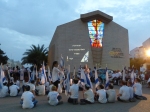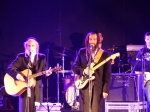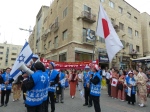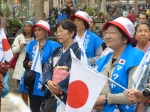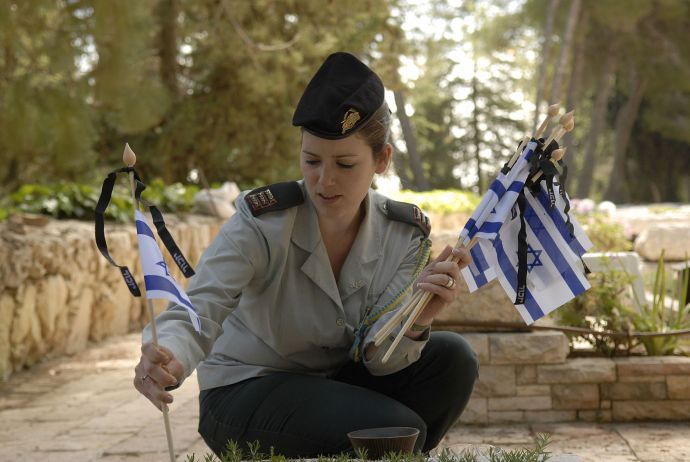
http://www.flickr.com/people/45644610@N03
Israel will be 69 years old on the night of May 1, 2017.
Those 69 years have been filled with both joy and sorrow. Israel has fought in 8 wars and military operations since its founding in 1948. Over 23,000 soldiers have been killed as a result of these operations and over 3,000 civilians have lost their lives due to terrorist attacks.
In a country as small as Israel (the most recent survey showed that Israel has about 8.7 million people), almost everyone has either had a family member killed or injured, or knows someone who was so affected.
Therefore, unlike most Americans today, Israel takes Memorial Day very seriously.
In 1968, The United States Congress changed the date of Memorial Day, which was originally May 30, to the last Monday in May to create a three day weekend. This has diluted the purpose of the day. On Memorial Day in the United States, the U.S. flag is lowered to half staff until noon. Americans who have lost family members or friends in the various wars and conflicts in which the United States has been engaged visit cemeteries to pay tribute to the fallen. Many attend Memorial Day parades which feature veterans and members of the various Armed Forces. There is also a National Memorial Day Concert which takes place on the lawn of the United States Capitol.
However, for most Americans the Memorial Day weekend means the unofficial start of the summer season, the Indy 500, NASCAR’s Coca-Cola 600, The Memorial Tournament golf event, the final of the NCAA Division I Men’s Lacrosse Championship, and, of course, Memorial Day Sales and barbecues.
In 2000, perhaps in response to the dilution of the meaning of the day, Congress passed the National Moment of Remembrance Act, asking people to stop and remember the fallen at 3:00 P.M on Memorial Day Monday. To mark the Moment, Major League Baseball games halt, Amtrak train whistles sound across the country, and other organisations do what they can to remind Americans to observe the Moment.
For Israel, the pain of the loss of the fallen is very fresh. This year another 97 people were added to that roster of heroes. There are over 9,000 bereaved parents in Israel, almost 5,000 widows and close to 2,000 orphans under the age of 30, all of whom lost a family member fighting for Israel’s right to exist. This number does not include the relatives and friends of the over 3,000 civilians killed by terrorists.
Israel understands all too well the debt of gratitude it owes to its soldiers and its heroes who sacrificed their lives so that Israel could exist and be free. Therefore, Israel’s Memorial Day, Yom Hazikaron, is taken very seriously.
It officially begins with a one minute siren, heard throughout the country, at 8 P.M., during which the entire nation stands still for one minute. Even traffic is halted. This is followed by an official State Ceremony at the Western Wall (the Kotel) in Jerusalem and other gatherings and services throughout the country. (Israelis take this moment so seriously that yesterday, Sunday, a group of Israelis on a flight from Marrakesh to Munich stood silently for one minute at 8 P.M.)
For the next 24 hours, all theatres, cinemas, nightclubs, bars, etc. are closed. Radio and television station broadcast programs portraying the lives and heroic deeds of fallen soldiers and play melancholy music which conveys the mood of the day.
A second memorial siren, this one lasting for two minutes, is sounded at 11 A.M. the next morning, marking the beginning of the public recitation of prayers in the military cemeteries throughout the country. The official service is held at Mt. Herzl in Jerusalem. Flags are lowered to half staff, special memorial prayers are recited, government officials speak, and a wreath is laid. The ceremony usually concludes with a military gun salute.
At 1PM another national service takes place at Mt. Herzl, this one honoring the memories of those felled by terrorist acts.
This year over 1.5 million Israelis are expected to pay their respects at the graves of those killed in Israel’s struggles.
Schools are open, but almost every high school in Israel has a “memorial corner” with the pictures of the school’s graduates who were killed defending the State. Some high schools organize their own Yom Hazikaron ceremonies and invite the families of the fallen graduates to participate.
Students wear white shirts and blue pants, or skirts, to school that day and soldiers wear their uniforms to the military cemeteries.
A few minutes after sundown, when Memorial day ends, the official switch from Yom Hazikaron to Yom Ha’atzmaut, Israeli Independence Day, takes place. In a ceremony on Mount Herzl in Jerusalem, the flag is raised from half staff to the top of the pole. The president of Israel then delivers a speech of congratulations, and soldiers representing the Army, Navy, and Air Force parade with their flags. This is followed by a torch lighting ceremony, marking the country’s achievements, Many municipalities have their own flag ceremony in which students march with the Israeli flag.
Israelis celebrate Independence Day in a number of ways. Many cities have nighttime activities, fireworks and free concerts. Many spend the night singing Israeli songs and dancing Israeli folk dances. During the day, many families go on hikes and picnics. Others barbeque at home or with family and friends. Army camps are open to the public and many museums and cultural institutions offer free admission and programs. The day concludes with the granting of the Israeli Prize to individuals who have made unique contributions to Israel’s culture, science, arts and humanities.
The juxtaposition of these two very disparate days and moods is both very moving and meaningful. It helps us realise that freedom is not free. There is a high price to pay and we should be eternally grateful to those who pay it.
Let us hope that no additional names will be added to the list of the fallen and that we will finally be able to live together in peace.





